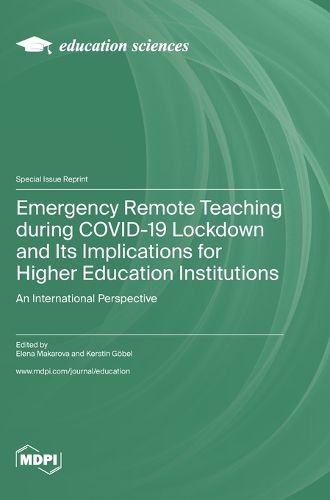Readings Newsletter
Become a Readings Member to make your shopping experience even easier.
Sign in or sign up for free!
You’re not far away from qualifying for FREE standard shipping within Australia
You’ve qualified for FREE standard shipping within Australia
The cart is loading…






This title is printed to order. This book may have been self-published. If so, we cannot guarantee the quality of the content. In the main most books will have gone through the editing process however some may not. We therefore suggest that you be aware of this before ordering this book. If in doubt check either the author or publisher’s details as we are unable to accept any returns unless they are faulty. Please contact us if you have any questions.
In spring 2020, the COVID-19 virus and subsequent lockdown demanded that university institutions across the globe undertake an emergency migration to online teaching. To secure the continuation of university teaching, Emergency Remote Teaching (Bozkurt and Ramesh, 2020)-prompt rethinking and adjustment among university teachers-had to be managed. On the one hand, this abrupt change is associated with a certain digital and pedagogical potential for change due to the necessary adaptation efforts. On the other hand, it also poses an extraordinary organisational and pedagogical challenge. From an empirical perspective, it is therefore crucial to ask how university teachers and universities are tackling the coronavirus situation against the backdrop of the goal to maintain high-quality teaching. Furthermore, the adjustment and well-being of students in the context of hybrid and distance learning situations must remain in focus. The aim of this Special Issue was to provide unique insights into organisational, pedagogical, and psychological challenges related to digital transition in Higher Education institutions in different countries resulting from university lockdowns during the COVID-19 pandemic. It also discusses digital and pedagogical potentials evolving through the adaptation efforts related to the situation of Emergency Remote Teaching at universities.
$9.00 standard shipping within Australia
FREE standard shipping within Australia for orders over $100.00
Express & International shipping calculated at checkout
This title is printed to order. This book may have been self-published. If so, we cannot guarantee the quality of the content. In the main most books will have gone through the editing process however some may not. We therefore suggest that you be aware of this before ordering this book. If in doubt check either the author or publisher’s details as we are unable to accept any returns unless they are faulty. Please contact us if you have any questions.
In spring 2020, the COVID-19 virus and subsequent lockdown demanded that university institutions across the globe undertake an emergency migration to online teaching. To secure the continuation of university teaching, Emergency Remote Teaching (Bozkurt and Ramesh, 2020)-prompt rethinking and adjustment among university teachers-had to be managed. On the one hand, this abrupt change is associated with a certain digital and pedagogical potential for change due to the necessary adaptation efforts. On the other hand, it also poses an extraordinary organisational and pedagogical challenge. From an empirical perspective, it is therefore crucial to ask how university teachers and universities are tackling the coronavirus situation against the backdrop of the goal to maintain high-quality teaching. Furthermore, the adjustment and well-being of students in the context of hybrid and distance learning situations must remain in focus. The aim of this Special Issue was to provide unique insights into organisational, pedagogical, and psychological challenges related to digital transition in Higher Education institutions in different countries resulting from university lockdowns during the COVID-19 pandemic. It also discusses digital and pedagogical potentials evolving through the adaptation efforts related to the situation of Emergency Remote Teaching at universities.